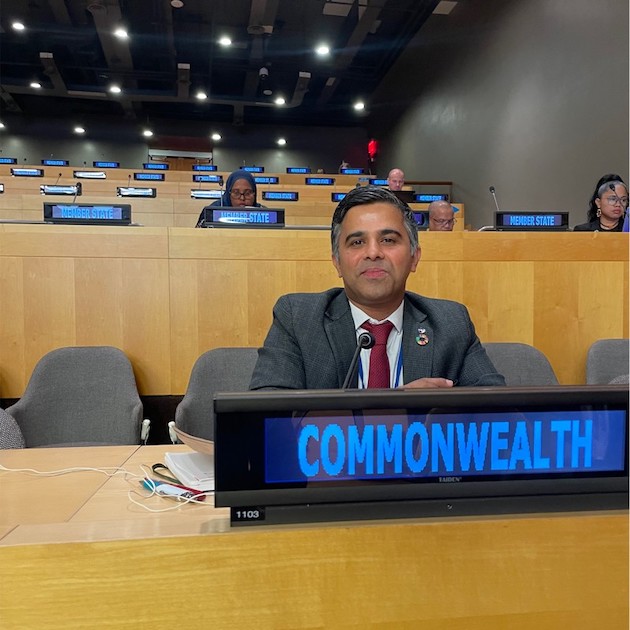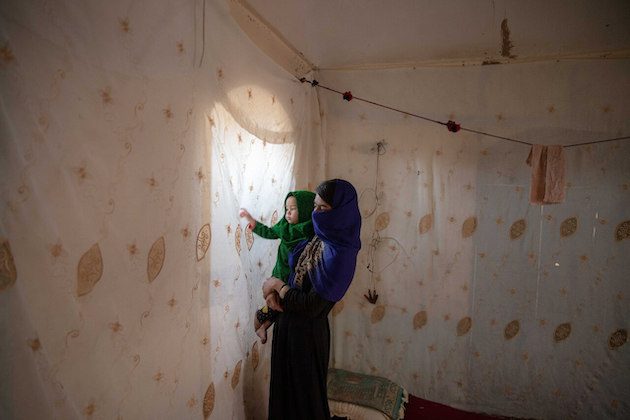Strengthen Climate Resilience in Small and Vulnerable Countries — Global Issues
KARNATAKA, INDIA, Nov 23 (IPS) – With a focus on strengthening the resilience of small and vulnerable member countries, Unnikrishnan Nair says the Commonwealth Secretariat is working to align development and climate finance for maximum impact.
Nair, who is the Head of Climate Change in the Economic, Youth, and Sustainable Development Directorate, told IPS in an exclusive interview that to “build resilience and avoid the reversal of development gains due to climate change, climate action must be integrated into development projects so that the funding supports the necessary climate change outcomes.”
The Commonwealth Climate Finance Access Hub (CCFAH) has served as a “catalyst to help vulnerable countries access climate finance to enhance resilience. To date, USD 315.413 million of climate finance mobilised, including USD 8.1 million in co-financing for 79 approved projects (33 adaptation, 10 mitigation, and 36 cross-cutting) in 14 Commonwealth countries.”

Here are excerpts from the interview:
IPS: Please give us an overview of the current climate change policies and strategies the Commonwealth Secretariat implements. How do these policies align with broader national and international climate goals?
Nair: The Climate Change Programme of the Commonwealth Secretariat focuses on strengthening the resilience of Commonwealth small and other vulnerable member countries to the negative impacts of climate change. It provides member countries with measures and support for mitigating and adapting to a changing climate. The programme facilitates the human and institutional capacity development of member countries to access public and private climate funding to meet their Paris Agreement commitments, including the implementation of their Nationally Determined Contributions. The Commonwealth Climate Change Programme advocates for international policies, mechanisms, and rules to be more responsive to the development needs of Small Islands Developing States, and other vulnerable countries. The Programme’s support is delivered through various mechanisms and partnerships, including:
- Commonwealth Climate Finance Access Hub with a focus on increasing access to climate finance.
- Commonwealth Call to Action on Living Lands aimed at accelerating climate action around land.
- Commonwealth NDC Programme focuses on fast-tracking implementation and achievement of climate targets in line with the Paris Agreement.
- Geospatial Programme targeted at the use of geospatial data and information for climate decisions.
- Integration of Gender and youth for Climate Action, promoting inclusive climate action
- Low Carbon & Climate Resilient Health Sector with special focus on Health sector adaptation and mitigation planning
IPS: In what ways does your directorate address the economic impacts of climate change? Are there specific measures to promote sustainable economic development in the face of climate-related challenges?
Nair: One of the major initiatives of the Commonwealth Climate Change Programme is to undertake the Climate Public Expenditure and Institutional Review (CPEIR) to enable the consideration of climate change in the national development planning and budgeting process. This initiative applied the World Bank methodology for undertaking the CPEIR and was based on the data and information provided by the Ministry of Finance.
The CPEIR reviewed the overall climate policy adequacy in the country and analysed the strengths and weaknesses of the institutional set-ups, considering current climate change priorities and future challenges. The process also undertook an analytical review of climate expenditure and showed how the country had been allocating funds from public finance in dealing with the impacts of climate change. Initial results and recommendations were shared in a virtual validation workshop, in which a large set of participants from government institutions, the private sector, and development partners provided input, endorsed the study’s conclusions, and appreciated the recommendations.
IPS: How does your directorate engage with youth in the context of climate change and sustainable development? Are there initiatives to empower youth by advocating for and implementing climate-friendly practises?
Nair: Young people are key stakeholders in climate action, and as future decision-makers, they need to be fully engaged in climate processes, providing their perspectives, innovative ideas, and experiences that can help shape and accelerate climate action.
The integration of youth into climate change initiatives is fundamental to building resilience and developing robust climate mitigation and adaptation proposals.
The Secretariat has mandated advisers operating under the CCFAH to integrate youth considerations across all projects supported in-country to ensure that climate finance delivered in member states takes account of the needs of young people.
Commonwealth Youth Initiatives
- Commonwealth Youth Climate Network (CYCN)
- Commonwealth Youth Statement on Climate Change
- Intergenerational Dialogue on Climate Change (held at COP)
- Commonwealth Youth Development Index and Report, Climate Section
- Enhancing Access to Finance for Youth in Green Entrepreneurship
- Summer School on Climate Justice support with the Pan African Climate Justice Alliance (PACJA)
- Climate Finance Teach-in Session during the Global NDC Youth Engagement Forum
- Internship Programme
IPS: How does your directorate integrate the Sustainable Development Goals (SDGs) into its climate change and economic development initiatives? Can you highlight specific projects or programmes that contribute to multiple SDGs simultaneously?
Nair: While aligning NDCs and SDGs is important, it requires funding. Climate finance plays a crucial role in’ building back better,’ as adequate funding is vital to support climate action, resilience-building, and sustainable development efforts.
Equally, to build resilience and avoid the reversal of development gains due to climate change, climate action must be integrated into development projects so that the funding supports the necessary climate change outcomes. In other words, aligning development and climate finance is essential to maximising impact. Development projects should be able to access climate funding, and climate projects should access development funding.
The Commonwealth Climate Finance Access Hub (CCFAH) is a significant enabler. By deploying Commonwealth national, regional, and thematic climate finance advisers to support governments, the CCFAH serves as a catalyst to help vulnerable countries access climate finance to enhance resilience. To date, US$ 315.413 million of climate finance has been mobilised, including US$ 8.1 million in co-financing for 79 approved projects (33 adaptation, 10 mitigation, and 36 cross-cutting) in 14 Commonwealth countries.
Some CCFAH projects are linked to the Living Lands Charter: A Commonwealth Call to Action on Living Lands (CALL). This initiative supports the alignment of climate action and sustainable development by safeguarding global land resources and taking coordinated action to address climate change, biodiversity loss, and land degradation while promoting sustainable, climate-resilient land management and agriculture.
IPS: What roles do innovation and technology play in your directorate’s approach to achieving sustainable development goals and combating climate change? Are there specific technologies or innovations that have shown promise in your initiatives?
Nair: On the technology front, one of the most important initiatives is an innovative project based on a partnership between Fiji, the Solomon Islands, and Vanuatu and a consortium of international partners working together to support and build climate resilience and enhance decision-making using satellite remote sensing technology.
The Commonwealth Secretariat is the thematic lead on climate finance and provides technical assistance to the three countries in utilising the geospatial-based platforms for enhanced access to climate finance.
The project is designed to enhance capacities, introduce technological advancements (including artificial intelligence-based methods), and provide integrated solutions for decision-making related to Disaster Risk Reduction (DRR), climate resilience, environmental preservation, and food security.
IPS: How does your directorate measure the impact of its programmes and initiatives on climate change, economic development, and youth empowerment? Are there key performance indicators or metrics used to assess progress?
Nair: The programme, based on requirements, appoints external third parties to assess its performance and results through its relevance, effectiveness, efficiency, coherence, and sustainability, per the OECD Development Assistance Committee Guidelines. This is a formative evaluation of the programme, focusing on assessing the initial results, effectiveness of the programme’s processes, and lessons learned. The evaluation is also supported by case studies to illustrate examples of how the programme operates and to identify success factors and lessons learned.
IPS: How does your directorate contribute to building the capacity of individuals and communities to respond to climate change and engage in sustainable development? Are there specific training programmes or educational initiatives?
Nair: The Commonwealth Climate Change programme is focused on building the technical and institutional capacity of small and other vulnerable states to engage and navigate through the complex climate action landscape and to take action to address the long-term impacts of climate change. This is achieved by strengthening the technical and policy infrastructure in the country, thereby improving an enabling environment for attracting technical and financial support by devising long-term climate action plans and pipelining climate finance projects, policies, and institutions.
Under the Commonwealth Climate Finance Access Hub (CCFAH), rather than offering short-term consultation to countries, the project embeds qualified national advisers for a three-year period to support the country in all areas of climate finance. This embeds knowledge transfer formally through workshops, training, and continuous support in priority areas for the government. This generates a critical mass of national government officials and relevant institutions directly responsible for climate action who are capacitated to tackle various aspects of climate finance, including project development, gender mainstreaming, environmental and social governance, policy support, etc. This CCFAH ‘write shop’ approach to capacity building focused on learning by doing has proven to support the sustainability of outcomes. This approach also helps develop a critical mass of officials in government departments responsible for climate action.
IPS: What are your directorate’s major challenges in implementing climate change, economic, and sustainable development initiatives? Are there notable opportunities or innovations that could positively impact your work?
Nair: The Commonwealth Climate Change Programme is facing several challenges in implementing climate change, economic, and sustainable development initiatives. The prominent three are:
Diverse Member States: The Commonwealth comprises countries with diverse economic structures, levels of development, and vulnerabilities to climate change. Tailoring initiatives to suit each member state’s specific needs and capacities is a complex task, requiring flexibility and inclusivity in programme design and implementation.
Limited Resources: Resource constraints hinder the ability of the programme to invest in comprehensive climate change and sustainable development initiatives. Mobilising adequate financial resources to support these programmes, especially for smaller and less economically developed nations, is a persistent challenge.
Capacity Building: Enhancing the capacity of member states to plan, implement, and monitor climate change initiatives is crucial. Many countries within the Commonwealth lack the technical expertise and institutional capacity needed to carry out these programmes, necessitating targeted capacity-building efforts.
IPS: How does your directorate collaborate on climate change and sustainable development issues with international organisations and other countries? Are there ongoing partnerships that have been particularly fruitful?
Nair: The Commonwealth Climate Change Programme actively collaborates with international organisations and other countries to address pressing climate challenges. Through diplomatic channels and multilateral forums, the programme fosters partnerships that transcend borders, facilitating the exchange of knowledge, expertise, and best practises in the realms of climate change and sustainable development. This collaboration involves joint technical initiatives, capacity-building programmes, and sharing best practises aimed at inclusive climate change adaptation and mitigation strategies in line with national sustainability practises. By participating in international dialogues and contributing to global initiatives, the programme strives to create a cohesive and coordinated approach to tackle the complex and interconnected issues of climate change and sustainable development, recognising that only through unified efforts can we effectively address the shared challenges facing our planet.
Some of the very fruitful partnerships under the Commonwealth climate change programme are with the following:
-
- Australian Government Department of Foreign Affairs and Trade
- Foreign, Commonwealth and Development Office (FCDO), Government of the United Kingdom
- United Nations Institute for Training and Research (UNITAR)
- Norad (Norwegian Agency for Development Cooperation)
- NDC Partnership
- United Nations Convention to Combat Desertification
- World Health Organization
- United Nations Framework Convention on Climate Change (UNFCCC)
- PCCB Network
- Africa NDC Hub.
IPS UN Bureau Report
Follow @IPSNewsUNBureau
Follow IPS News UN Bureau on Instagram
© Inter Press Service (2023) — All Rights ReservedOriginal source: Inter Press Service
Check out our Latest News and Follow us at Facebook
Original Source





